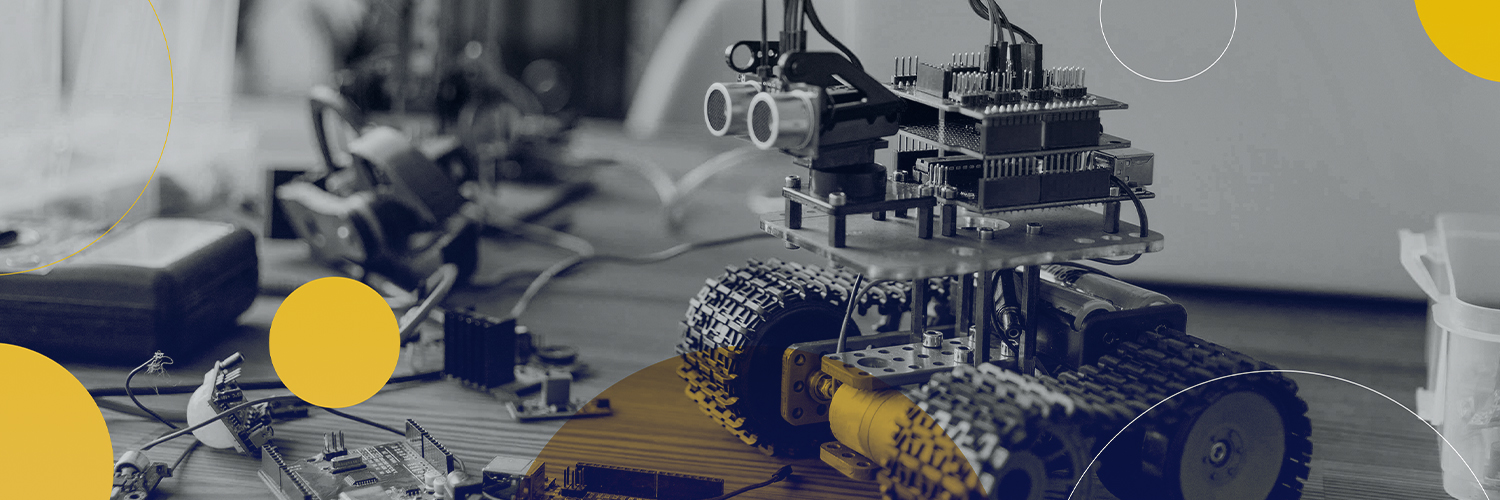Mechatronics engineering is an interdisciplinary field of engineering that integrates concepts of mechanical, electrical, and computer engineering to create cutting-edge machines, systems, and gadgets that incorporate both mechanical and electronic components. Prime examples of mechatronics used in daily lives of people are in the form of devices like robotic vacuum cleaners, video-camera security devices, drones, hard disks, etc.
To design and create cutting-edge solutions that combine sensors, controls, actuators, and software to automate and optimize complex systems, mechatronics engineers draw on their expertise in mechanics, electronics, and computer systems. They work on a variety of items, including robots, automation systems, manufacturing machinery, medical gadgets, and aerospace systems, among others. They are in charge of all stages in the entire process of developing a product, from design, testing to maintenance.
Since the Japanese engineer Kikuchi Hiroshi first used the word “mechatronics” in 1969, the area has developed into a multidisciplinary technical domain that combines mechanical, electrical, and software systems to produce smart, automated, and intelligent solutions. Engineers in the field of mechatronics are tasked with creating systems that are capable of carrying out a variety of activities, from basic mechanical movements to very accurate operations requiring real-time sensing, processing, and control.
The interaction of mechanical engineering, electrical engineering, and computer science forms the basis of mechatronics engineering. Designing and analyzing mechanical systems, including structures, materials, and mechanisms, requires skill in mechanical engineering. Circuits, motors, sensors, and actuators are just a few examples of the electrical and electronic systems that electrical engineering concentrates on designing and analyzing. The methods and tools for programming, control algorithms, and the creation of human-machine interfaces are provided by computer science and software engineering.
Mechatronics engineering is an interdisciplinary field that fosters the creation of novel solutions to difficult engineering problems when more conventional methods could fall short. Mechatronics engineers, for instance, may create autonomous robots that use a combination of mechanical parts, sensors, and intelligent control algorithms to move around, comprehend their surroundings, and interact with objects. By fusing sensors, actuators, and control systems, mechatronics engineers may create advanced manufacturing systems that streamline production procedures, enhance product quality, and cut costs.
Mechatronics Engineering Applications
Engineering in mechatronics has many uses in many different sectors, and its effects are felt in many facets of our daily lives. Mechatronics engineering has several important applications, including:
Automotive industry: From passenger cars to commercial trucks, new vehicles are designed and developed with the help of mechatronics engineers. Advanced driver assistance systems (ADAS), autonomous vehicles, and the design of powertrain systems including engines, transmissions, and drivetrains are all projects that mechatronics engineers work on. The design of comfort and safety systems including airbag, brake, and suspension systems is also influenced by mechatronics engineers.
Aerospace industry: Mechatronics engineering is essential in this field because complex systems like airplanes, spaceships, and drones call for meticulous automation and control. Aerial navigation, guiding, and control systems, as well as avionics systems including flight control, communication, and sensor systems, are all created and developed by mechatronics experts. The design of satellite systems, including remote control, communication, and propulsion systems, also benefits from the work of mechatronics experts.
Robotics: The design, development, and use of intelligent, autonomous machines is the focus of robotics, which is a branch of mechatronic engineering. Robotic systems, comprising their mechanical architecture, sensors, actuators, and control systems, are designed by mechatronics engineers. Numerous industries, including industry, healthcare, agriculture, and space exploration, use robotics. Robots are employed in the manufacturing industry, for example, to complete activities like welding and assembly.
Acharya offers Mechatronics Engineering with top-notch educational infrastructure and industrial exposure making it one of the best colleges in Bangalore for mechatronics engineering.
Subjects
The course subjects in this branch of engineering include mechanics of materials, mechanical behaviour, machine shop and material testing lab, Analog and Digital Electronics, Fluid Dynamics, Robotics and Automation, Computer Integrated Manufacturing, Modeling and Simulation.
Career Scope
The career scope of a Mechatronics Engineer includes but is not limited to working as a Robotics Engineer, Control Systems Engineer, Automation Engineer, Product Development Engineer, and Research and Development Engineer.
Numerous industries, including the automotive, aerospace, manufacturing, robotics, automation, and consumer electronics, use mechatronic engineering in a variety of ways. India is predicted to experience an increase in demand for Mechatronics Engineers due to its fast adoption of automation and robots. The design and development of mechatronic systems, robotics and automation, control systems, product creation, testing and validation, maintenance and troubleshooting, and research and development are all areas where mechatronic engineers might find employment. In the discipline of mechatronics, there are also chances for entrepreneurship.
Overall, the subject of mechatronics engineering is growing rapidly and offers a variety of professional options. Mechatronics engineers are projected to become more and more in demand as automation and technology advance. Therefore scope for mechatronics engineering in both research and employment is great.
Salary of Mechatronics Engineers
Due to the demand for their expertise across a number of industries, including automotive, aerospace, robotics, automation, manufacturing, and consumer electronics, mechatronics engineers may often anticipate competitive pay. Estimated salaries for graduates of mechatronics engineering range from 3.5LPA-7LPA for freshers and the salary for experienced mechatronics engineers is 10-15 LPA approximately. The salary may vary depending on the company, individual skills, and location.






























